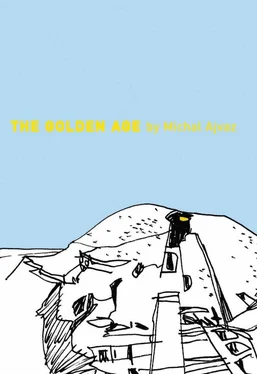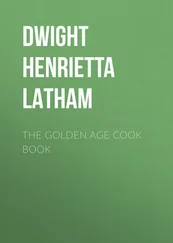Michal Ajvaz - The Golden Age
Здесь есть возможность читать онлайн «Michal Ajvaz - The Golden Age» весь текст электронной книги совершенно бесплатно (целиком полную версию без сокращений). В некоторых случаях можно слушать аудио, скачать через торрент в формате fb2 и присутствует краткое содержание. Год выпуска: 2010, Издательство: Dalkey Archive Press, Жанр: Современная проза, на английском языке. Описание произведения, (предисловие) а так же отзывы посетителей доступны на портале библиотеки ЛибКат.
- Название:The Golden Age
- Автор:
- Издательство:Dalkey Archive Press
- Жанр:
- Год:2010
- ISBN:нет данных
- Рейтинг книги:4 / 5. Голосов: 1
-
Избранное:Добавить в избранное
- Отзывы:
-
Ваша оценка:
- 80
- 1
- 2
- 3
- 4
- 5
The Golden Age: краткое содержание, описание и аннотация
Предлагаем к чтению аннотацию, описание, краткое содержание или предисловие (зависит от того, что написал сам автор книги «The Golden Age»). Если вы не нашли необходимую информацию о книге — напишите в комментариях, мы постараемся отыскать её.
is Michal Ajvaz’s greatest and most ambitious work.
The Golden Age
The Golden Age — читать онлайн бесплатно полную книгу (весь текст) целиком
Ниже представлен текст книги, разбитый по страницам. Система сохранения места последней прочитанной страницы, позволяет с удобством читать онлайн бесплатно книгу «The Golden Age», без необходимости каждый раз заново искать на чём Вы остановились. Поставьте закладку, и сможете в любой момент перейти на страницу, на которой закончили чтение.
Интервал:
Закладка:
But suddenly it hit me that this assumption was false. Certainly, the making of insertions was the main activity demanded by the Book , but there was no guarantee that individual passages of text would settle in one place; indeed, passages went up and down in the hierarchy of levels — they might fall sharply before embarking on a steep climb, as if riding a Ferris wheel. It was not uncommon for a passage to disappear and then reappear in modified form as an insertion on the second, fifth or sixth level, to be lost again without trace in the bowels of the Book before bobbing up on the first level in white pages which had lost their text in one of those periods when hatred of words was paramount. The Book was really a cyclical entity, a demented structure whose foundations were on its roof. It was probable that the beginning of the Book had long ago been lost through the regular batterings it took as it was transformed, yet it may have been the case that the beginning remained hidden at the bottom of the deepest pocket — a pocket that was so distant that the motions of constant change could not reach it, which was buried so deep that it would exceed the patience of the most persistent of insertion speleologists.
Once a foreigner (myself, for example) had grown used to the Book ’s revolving-wheel nature, he was driven to distraction by the Book ’s other whims. The Book constantly violated the seemingly obvious rule that the number of flights taken in its descent should correspond — if the action were to be returned to the original level — to the number of flights taken in its ascent. It might happen, for example, that the hero of Story A was also the narrator of Story B, while in Story B the narrator of Story C made an appearance; but the action would not, as one would expect, return to Level B once Story C was finished — instead it was Story A which continued on the pasted-in strip. It was as if by some dark magic Story B and the world it described had disappeared from the Book entirely; but later, once we had recovered from it, Story B would continue in some wholly unreasonable place, say at Level F or Level G. The hero of a story on Level A wrote the novel Silver Cloud , which was played out on Level B. Some way into the story a character from Level B stepped into a bar on Level A, where he struck up a conversation with the cousin of the author of Silver Cloud . I didn’t know whether such offences against logic occurred by intention or through negligence, but to begin with they so exasperated me that I felt inclined to seek out their authors so I could throttle them. Fortunately the authors of individual parts of the Book were so entirely anonymous, there was no chance of finding out their names. Besides, to ask around after the identity of an individual author was socially unacceptable. The sense of shame it would provoke might have something in common with that known by the island’s kings, who would have liked to remain every bit as anonymous as the authors of the Book .
But this was not all. At certain points the Book would bite itself in the tail, so that it was barely possible to ascertain the level on which a given passage was located. (When counting off the levels, one could start wherever one chose.) Let us say that a character appears in Story A who is the narrator of Story B, while one of the characters in Story B is the narrator of Story C; then one of the characters in Story C begins to narrate not Story D (as one would expect) but Story A. (Escher’s lithograph Print Gallery is folded into itself in a similar way (although it has a simpler A (A) form. (In a gallery a visitor is looking at an art print which portrays a town which contains the gallery in which the visitor is standing. (I would like the reader to consider what this lithograph would look like if — like a story in the Book —it had the form A (B(C(A)))?))).) (If that last sentence was written by one of the authors of the Book it is quite possible, dear reader, that you would count in it three left-hand and thirteen right-hand parentheses.)
Karael and I once sat on the jetty in the lower town discussing the way the Book folded in on itself. We had been bathing in the harbour and had taken the Book along with us. (As I have mentioned, it was not necessary to treat the Book with any great care; smudged letters and marks were taken as part and parcel of the Book ’s transformation.) I argued that the form the Book took did not correspond to the arrangement of its contents, complaining that the rule was abused which stated that an insertion at the lowest level should be in an interior pocket; I also suggested how this might be corrected. It would be necessary to cut an opening into a pocket pasted on to Foldout A — the biggest, which contained Text B — and another into the pocket containing Text C which was inserted in the first pocket; a pocket could then be pasted on to the appropriate place on Text C. Where this new pocket was at its narrowest, it would be elongated so as to pass through both openings, only widening out once it had escaped the physical confines of the Book . The new pocket would need to be big enough to ensure that it could be turned back in towards Level A, closing this (and the whole Book along with it) inside itself. It would also be necessary to cut into this pocket an opening by which its beginning — which coiled out from pocket C — would be able to exit.
To my surprise, Karael understood my somewhat confused explanation; she quite liked the idea of a Book which absorbed itself, but straight away she objected that the observing of one rule would necessitate the violation of another — that by which nothing with its origins in a pocket should get out. We laughed about this. For a short while longer we thought up various fantastical forms the Book might take; as connectors of passages on various pages of the Book we imagined insertions like the kind of suspension bridge we had seen in adventure movies, and insertions that were like secret tunnels through the Book ’s pages, and insertions crawling out of the Book like rootstock, themselves the seeds of new books. Then we gave up on this and jumped into the water. After a while we looked back to where we had been sitting, where the unfurled strips of the Book ’s pages were fluttering in the wind like an ill-fated white jellyfish washed ashore by the incoming tide.
As I said, I never read the Book in its entirety; nor would anyone have been able to do so even had he wished to. (Besides, it is pointless to think of it as a whole Book as it will never be written to completion.) No one had ever known — except for the short time when it contained a few pages only — how long the Book was. The paper used for the innermost insertions was so thin that an epos greater in extent than everything I knew of the Book might have lain there undiscovered and unread, like an island Mahabharata, longer than the entire contents of the rest of the Book even though it was contained deep in a single pocket. It was impossible to read the Book from beginning to end for the simple reason that it was not apparent what was the beginning and what was the end. The system of insertions was so complicated and the paths were interwoven to such a degree that to take as the beginning the first word on the first page of the largest foldout would have been nonsensical.
I came across all manner of things in the insertions. After a while nothing would surprise me: I might pull out of a pocket a cookbook, a guide to what seemed to be an imaginary town (complete with detailed street-map), an exorbitantly long description of a sunset, a bizarrely distorted retelling of European history, or descriptions of animals (some real, some imaginary). I have noticed that a lot of literary critics are bothered by the mixing of genres; indeed, some of them are so easily offended in this regard that they experience distress when faced with trifles like the use in a passage of fiction of concepts of theory (as if there were some fundamental difference between stories of people, animals, plants and objects on the one hand and stories of concepts on the other). What a torture it would be for them to read the island’s Book , in which it is common for a lyrical passage to give way to several pages of description related in chemical formulae!
Читать дальшеИнтервал:
Закладка:
Похожие книги на «The Golden Age»
Представляем Вашему вниманию похожие книги на «The Golden Age» списком для выбора. Мы отобрали схожую по названию и смыслу литературу в надежде предоставить читателям больше вариантов отыскать новые, интересные, ещё непрочитанные произведения.
Обсуждение, отзывы о книге «The Golden Age» и просто собственные мнения читателей. Оставьте ваши комментарии, напишите, что Вы думаете о произведении, его смысле или главных героях. Укажите что конкретно понравилось, а что нет, и почему Вы так считаете.












